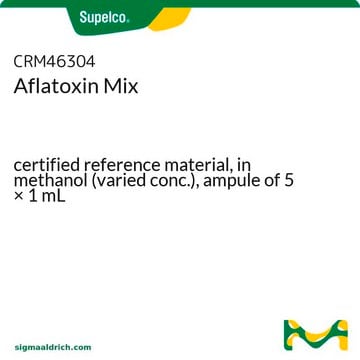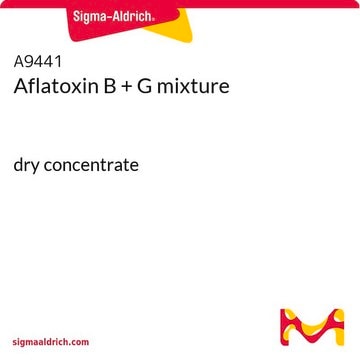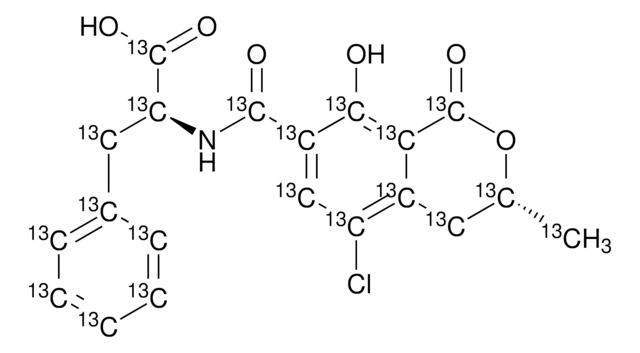O1877
Ochratoxin A
from Petromyces albertensis, ≥98% (HPLC), powder, mycotoxin
Synonym(s):
N-[(3R)-(5-Chloro-8-hydroxy-3-methyl-1-oxo-7-isochromanyl)carbonyl]-L-phenylalanine
About This Item
Recommended Products
product name
Ochratoxin A, from Petromyces albertensis, ≥98% (HPLC)
biological source
Petromyces albertensis
Quality Level
Assay
≥98% (HPLC)
form
powder
impurities
Benzene, free
solubility
ethanol: soluble
Mode of action
enzyme | inhibits
protein synthesis | interferes
storage temp.
2-8°C
SMILES string
C[C@@H]1Cc2c(Cl)cc(c(O)c2C(=O)O1)C(=O)N[C@@H](Cc3ccccc3)C(O)=O
InChI
1S/C20H18ClNO6/c1-10-7-12-14(21)9-13(17(23)16(12)20(27)28-10)18(24)22-15(19(25)26)8-11-5-3-2-4-6-11/h2-6,9-10,15,23H,7-8H2,1H3,(H,22,24)(H,25,26)/t10-,15+/m1/s1
InChI key
RWQKHEORZBHNRI-BMIGLBTASA-N
Looking for similar products? Visit Product Comparison Guide
Application
- to test its effect on metabolism and hypoxia in human embryonic kidney (HEK293) cells
- to test its cytotoxic effects in bovine mammary epithelial cells
- as a standard for gamma radiation studies with food products and in cytotoxic studies using Hep G2 cells
Biochem/physiol Actions
Preparation Note
Signal Word
Danger
Hazard Statements
Precautionary Statements
Hazard Classifications
Acute Tox. 2 Oral - Carc. 2
Storage Class Code
6.1A - Combustible acute toxic Cat. 1 and 2 / very toxic hazardous materials
WGK
WGK 3
Flash Point(F)
Not applicable
Flash Point(C)
Not applicable
Personal Protective Equipment
Certificates of Analysis (COA)
Search for Certificates of Analysis (COA) by entering the products Lot/Batch Number. Lot and Batch Numbers can be found on a product’s label following the words ‘Lot’ or ‘Batch’.
Already Own This Product?
Find documentation for the products that you have recently purchased in the Document Library.
Customers Also Viewed
Articles
DNA damage and repair mechanism is vital for maintaining DNA integrity. Damage to cellular DNA is involved in mutagenesis, the development of cancer among others.
Our team of scientists has experience in all areas of research including Life Science, Material Science, Chemical Synthesis, Chromatography, Analytical and many others.
Contact Technical Service















